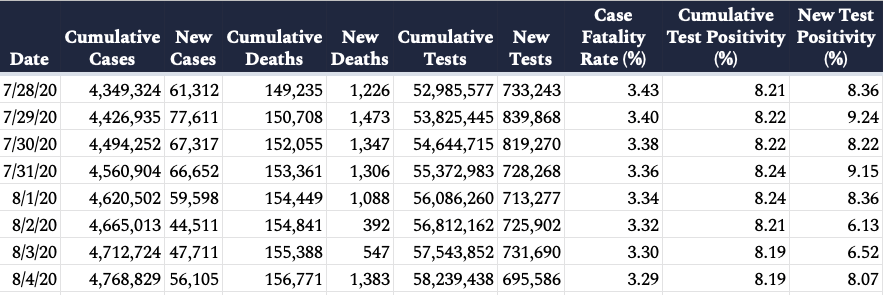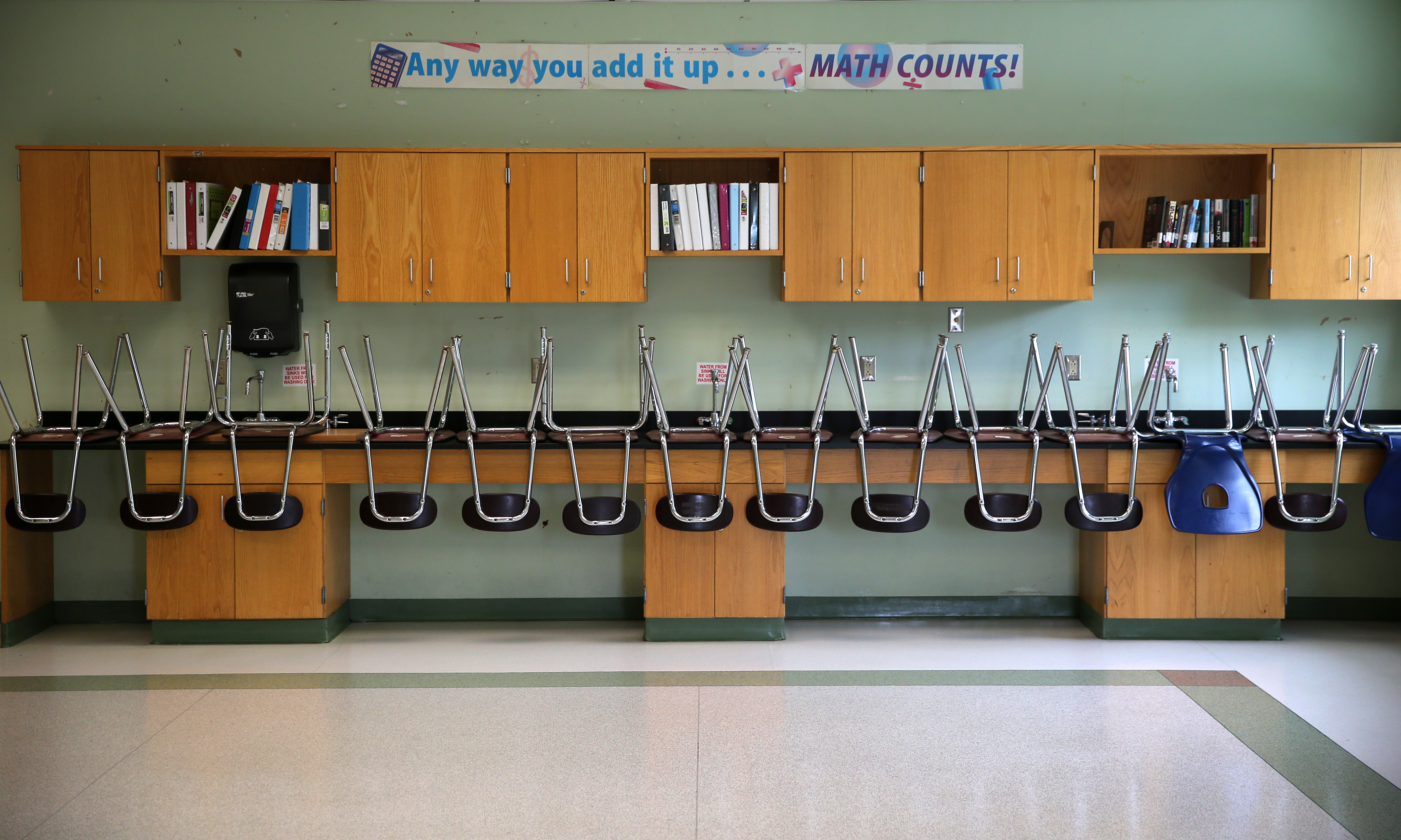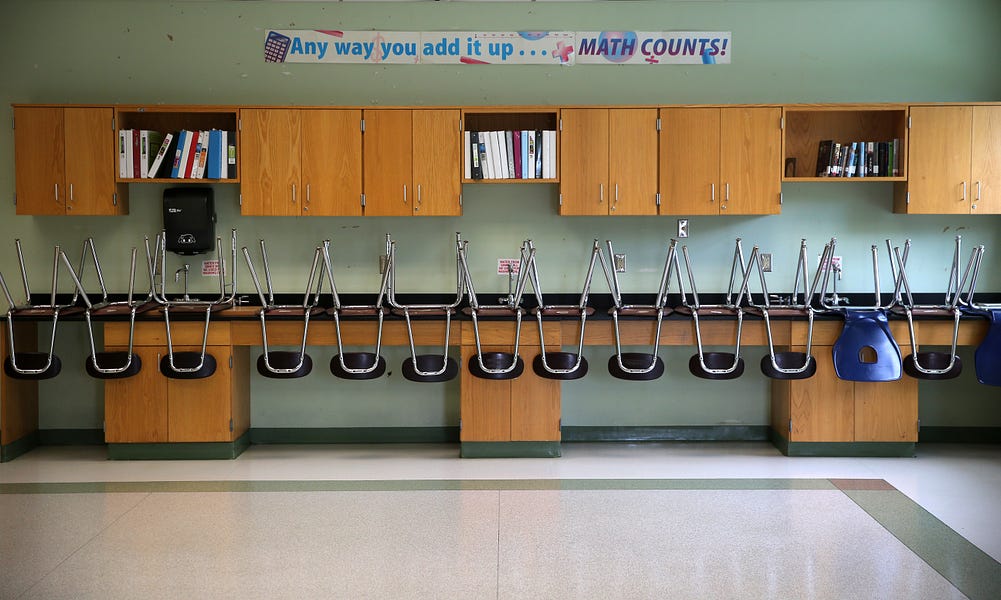Happy Wednesday! We didn’t realize how much you all loved the Presented Without Comment section—we promise to never leave you hanging again! (We had to cut it for space yesterday—our apologies.)
Quick Hits: Today’s Top Stories
-
The United States confirmed 56,105 new cases of COVID-19 yesterday, with 8.1 percent of the 695,586 tests reported coming back positive. An additional 1,383 deaths were attributed to the virus on Tuesday, bringing the pandemic’s American death toll to 156,771.


-
A massive explosion in Beirut, the capital of Lebanon, killed at least 70 people yesterday, injuring thousands more.
-
Results from an early trial showed that a COVID-19 vaccine from biotech company Novavax sparked the development of neutralizing antibodies, which may help prevent coronavirus infection, in each of the 130 volunteers in the study. About 80 percent participants experienced some sort of mild side effects—tenderness at injection site, headaches, fatigue—and Novavax plans to begin Phase 3 trials later this fall.
-
President Trump signed the bipartisan Great American Outdoors Act into law yesterday. The legislation—introduced by the late-Rep. John Lewis last year—will provide funding for national park restoration efforts and allocate $900 million per year to the Land and Water Conservation Fund.
-
Rep. Roger Marshall defeated Kris Kobach in the Republican primary in Kansas to succeed the retiring Sen. Pat Roberts. Although Trump did not endorse in the primary, many of his supporters backed Kobach, an immigration restrictionist and America Firster. Marshall’s win is a huge boon to the Republican establishment, who feared a Kobach nomination would throw a senate seat in reliably red Kansas to the Democrats.
-
A new Gallup poll found just 13 percent of American adults are “satisfied” with the way things are going in the United States right now, the lowest figure on the long-running survey since late 2011. American satisfaction had reached its 15-year high—45 percent—in February of this year.
-
A top Republican lawyer in Wisconsin filed papers to get Kanye West on the ballot yesterday. Lane Ruhland, who is working for the Trump campaign, didn’t comment as local news cameras captured her dropping off signatures required to qualify West as a presidential candidate, according to Vice News.
Private Schools and the Pandemic

As the nation barrels toward the start of the school year—just days away now, in many places—with many plans for what instruction will look like still in flux, some longstanding educational tensions are starting to rear their heads. Just look at what’s happened in Montgomery County, Maryland, where policy grappling between public and private schools this week required the intercession of Maryland Gov. Larry Hogan.
Public schools in many places around the country are strongly resisting calls from President Trump and Republicans to reopen for in-classroom instruction, citing the possible danger to teachers and staff, in addition to concerns about the health of students. Teachers’ unions have led the charge, with the American Federation of Teachers—the nation’s second-largest such union—authorizing its chapters to organize strikes over reopenings in cases where they deemed reopening safety standards insufficient.
In many places, this has led to a scenario where public schools are kicking the school year off with substantially more restrictive classroom plans than their local private schools. There are a few reasons for this: Private schools tend to be smaller than their neighborhood public schools, theoretically making pandemic-era instruction more achievable, and they are less frequently unionized.
So, many lockdown-battered parents, desperate to get their kids back into the classroom, are beating down the doors of private schools at previously unheard-of rates.
“We are seeing across-the-board increased interest in private schools, mainly by parents/families of children living in school divisions where local school boards have decided the public schools will conduct school virtually,” Grace Creasey, executive director of the Virginia Council for Private Education, told The Dispatch. “Many of our schools across the Commonwealth are either on a waiting list or have increased staffing to accommodate a surge in interest or enrollment.”
In Montgomery County—which includes many of Washington, D.C.’s Maryland suburbs—parents’ efforts to move toward private schooling were momentarily stymied last Friday, when the county health officer, Dr. Travis Gayles, announced the county would prohibit private schools from opening for in-person instruction.
The outcry was immediate. Private-school parents who had organized in an “Open Montgomery County, MD Private Schools” Facebook group plotted next steps; some families made plans to sue, arguing that schools were already doing their due diligence in putting forward powerful anti-virus precautions.
But that effort was forestalled on Monday, when Gov. Hogan—who was responsible for vesting Dr. Gayles with extraordinary pandemic powers in the first place—issued an emergency order restoring the power of deciding whether to reopen to individual schools.
“Over the last several weeks, school board and superintendents made their own decisions about how and when to reopen public schools, after consultation with state and local health officials,” Hogan said in a statement. “Private and parochial schools deserve the same opportunity and flexibility to make reopening decisions based on public health guidelines.”
Hogan may have avoided Montgomery County’s conflict, but a similar dynamic is currently playing out around the country. Juiced interest in private schools is likely to be met with chagrin by public educators around the country, given that decreased enrollment means decreased funds for school districts. Look forward to more messy squabbles like this in the days ahead.
The Homicide Rate Is Ticking Back Up After Decades of Decline
A new report from the Council on Criminal Justice—which tracked changes in 11 different criminal offenses across 27 American cities—found the homicide rate increased 37 percent from the end of May through June and the aggravated assault rate rose 35 percent over the same period. Chicago, Philadelphia, Milwaukee, Louisville, Nashville, and Detroit accounted for some of the biggest spikes. “In general,” the report concluded, “property and drug crime rates decreased, while violent crime rates increased during [the spring and early summer].”

A Wall Street Journal analysis of crime statistics casts a broader net, gathering data from the nation’s 50 largest cities. Its findings? Homicides have risen by 24 percent so far this year. The murder rate has increased by double digits in 36 of the 50 cities included in the study. Robberies, conversely, have decreased by around 11 percent year-over-year.
Despite the surge in recent months, the homicide rate remains far closer to its historic low-point than its peak. According to data from the FBI’s Uniform Crime Reporting Program compiled by the Disaster Center, the homicide rate over the past 60 years topped out at 10.2 murders per 100,000 people in 1980. It was less than half that—5.0 per 100,000—in 2018. The statistic reached its nadir in 2014, when there were just 4.4 murders per 100,000 people.
Still, the uptick is concerning. It’s difficult to pinpoint exactly what’s causing the surge, but the pandemic—and the lockdowns and mass unemployment it brought with it—is almost assuredly playing a leading role. The virus has caused important, stabilizing institutions—schools, churches, law enforcement—to retreat from the lives of communities where they play a vital role in maintaining order. Given violent crime began to spike in earnest in late May and early June, the mass unrest in the wake of George Floyd’s death likely also contributed. The demonstrations—particularly those that turned violent—served the dual purpose of diverting law enforcement resources and discouraging proactive policing.
“In our urban centers where we’ve had a lot of violence related to civil unrest, the police—rather than do their normal duties—are having to spend an inordinate amount of time protecting buildings or ensuring that violence does not escalate or get out of hand,” G. Zachary Terwilliger—U.S. attorney for the Eastern District of Virginia—told The Dispatch.
Perhaps equally important, the overwhelming national anti-police movement, and refusal by prominent elected officials to condemn violence committed on behalf of it, deters law enforcement from doing its job. Between June 17 and June 20, for example, 170 Atlanta police officers called off sick from work after the police shooting of Rayshard Brooks.
You “have a lot of officers—who are law abiding, doing their jobs—who feel completely besieged and that they can do no right,” Terwilliger said. “As a result, they’re less likely to engage and engagement is critical to tamping down violent crime. … Historically, any time the police pull back, violent crime and criminals fill the void. We had pulling back after Ferguson, Missouri. You had pullback in Baltimore after Freddie Gray.”
So what’s the best path forward? “We need to have a multi-pronged problem solution,” Terwilliger argued. “Police officers need to be empowered to do their job. It doesn’t mean that there shouldn’t be reform and it doesn’t mean that there shouldn’t be additional training. I saw the same thing that the rest of America did with the murder of George Floyd. But we can’t have the police recede.”
What We Know (And Don’t) About the Explosion in Beirut
Shortly after 6 p.m. local time yesterday, a series of harrowing videos depicting a massive explosion in downtown Beirut began to circulate across the internet.
A day later, much remains unknown about the blast: its death toll, its cause, its geopolitical significance. Here is the picture as of this morning, based on publicly available information.
Lebanon Health Minister Hassan Hamad said that the government’s preliminary count found at least 70 people died in the explosion near Beirut’s port, and more than 3,000 were injured. Mohammed Fahmi, Lebanon’s Interior Minister, told reporters a stockpile of 2,700 tons of ammonium nitrate—confiscated from a cargo ship six years ago—caused the explosion, but it’s unclear as of now what led to that stockpile detonating.
“I’d like to extend my deepest condolences to all those affected by the massive explosion at the port of Beirut today,” Secretary of State Mike Pompeo said in a statement. “We understand that the Government of Lebanon continues to investigate its cause and look forward to the outcome of those efforts.”
In a press briefing last night, President Trump extended his sympathies to the people of Lebanon and offered them the United States’ assistance, routine after such a tragedy. But Trump then went further, referring to the explosion as a “terrible attack.” When pressed on the intel supporting that statement, Trump said he “met with some of our great generals” who “just seem to feel that it was.”
“They seem to think it was [an] attack,” he continued. “It was a bomb of some kind.”
The official Pentagon response to Trump’s assertion was that “the Department of Defense refers you to the White House on this matter.” But granted anonymity by CNN to speak more candidly, three U.S. Defense Department officials said there is no evidence as of now that indicates the explosion was an attack.
Worth Your Time
-
New York Gov. Andrew Cuomo has received heaps of media praise for his handling of the coronavirus pandemic in New York—but is it deserved? The density and population of New York City presents a unique challenge in containing the virus, yes, but as Noah Rothman points out in this piece for The Bulwark, Cuomo erred in some pretty serious ways that likely cost New Yorker lives. “New York and its governor were no doubt victims of unforeseen circumstances,” Rothman writes. “But it does no one any favors to paper over the actions Governor Cuomo took that proved counterproductive and, at times, deadly.”
-
Yesterday in The Atlantic, a New York-based intensive-care nurse named Kristen McConnell—whose husband is a teacher—implored American educators to come back to work in the fall. McConnell makes clear that she supports “teacher-led campaigns to make sure that safety measures are in place,” but that she’s against preemptive “safety strikes” like the one being threatened by the American Federation of Teachers. “I can understand that teachers are nervous about returning to school,” she writes. “But they should take a cue from their fellow essential workers and do their job. Even people who think there’s a fundamental difference between a nurse and a teacher in a pandemic must realize that there isn’t one between a grocery-store worker and a teacher.”
Something Fun
Houston-area readers: Hit Curbside Larry up.
Presented Without Comment
Presented Without Comment, Part 2
Toeing the Company Line
-
David’s latest French Press (🔒) takes a look at a new study on the increasing prevalence of self-censorship in our daily lives. Celebrities falling victim to “cancel culture” get all the media attention, but the bigger problem is far more local and personal. “We’re self-censoring online, in our families, and in our workplaces for many of the same reasons why we self-censored in the middle-school cafeteria,” David writes. “Peer pressure from the people we interact with in our daily lives.”
-
Jonah is traveling this week, but he wouldn’t abandon all you loyal Remnant listeners. Be sure to check out the first installment of his two-part podcast with Washington Post columnist Megan McArdle.
Let Us Know
If you plan to vote in November, do you plan to do so in person? Have you taken steps to vote absentee or otherwise by mail?
Reporting by Declan Garvey (@declanpgarvey), Andrew Egger (@EggerDC), Sarah Isgur (@whignewtons), Charlotte Lawson (@charlotteUVA), Audrey Fahlberg (@FahlOutBerg), Nate Hochman (@njhochman), and Steve Hayes (@stephenfhayes).
Photograph by David L. Ryan/Boston Globe/Getty Images.







Please note that we at The Dispatch hold ourselves, our work, and our commenters to a higher standard than other places on the internet. We welcome comments that foster genuine debate or discussion—including comments critical of us or our work—but responses that include ad hominem attacks on fellow Dispatch members or are intended to stoke fear and anger may be moderated.
With your membership, you only have the ability to comment on The Morning Dispatch articles. Consider upgrading to join the conversation everywhere.